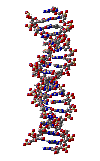|
Identified new genetic markers for high-risk cases of breast cancer
Researchers have found that small changes in the DNA sequence of genes involved in DNA repair are associated with different breast cancer susceptibilities in women, suggesting that these differences could be used as genetic markers for higher risk cases. Released as an advance online publication in the Breast Cancer Research and Treatment1journal, the work can help, not only in the early detection and treatment of the disease, but also gives a better understanding of the mechanisms behind it.
DNA repair genes, as the name indicates, repair damaged DNA in a process crucial for cancer prevention. In fact, all over the body genetic mutations are constantly occurring and being fixed through several DNA repair mechanisms and so avoid the accumulation of harmful mutations that can ultimately lead to cancer. As consequence it has been suggested that problems in the body’s DNA repair mechanisms/genes can facilitate the development of cancer.
Following this idea, Sandra Costa, Fernando Schmitt and colleagues in Portugal and Spain, decided to test if it was possible to correlate different forms of four major DNA repair genes existent in the human population to different susceptibilities to breast cancer. In fact, different individuals can present small differences in the DNA sequence of a gene, as it happens, for example, with the gene for eye colour where the variations give origin to the different colours. These different DNA sequences appear as result of mutations and are called genetic polymorphisms.
For this study Costa, Schmitt and colleagues analysed 285 breast cancer patients and 442 healthy controls looking at several genetic polymorphisms in four major DNA repair genes - XRCC1, XPD, RAD51 and XRCC3 - and their relationship with breast cancer incidence.
It was found that women carrying the genetic polymorphism XRCC1 399Gln and who had no family history of breast cancer, had not only less disease than healthy controls, but it was also found that disease, when it occurred, started later in life. This result suggested that XRCC1 399Gln had a protective effect against breast cancer.
On the opposite side of the spectrum, a genetic polymorphism in the XRCC3 gene - XRCC3 241Met - increased susceptibility to the disease and accelerated disease onset. Again this was only observed in women without a family history of breast cancer.
Finally, the team of researchers found that the polymorphism RAD51 135C increased the risk of breast cancer, this time in the group of women that belonged to families with previous cases of the disease. Variations in the fourth gene studied – XPD – did not show any effect in the incidence of breast cancer at least among the groups and the polymorphisms analysed in this work
Breast cancer is the most common type of cancer and the second leading cause of cancer death among women. According to the World Health Organization every year more than 1 million of people will be diagnosed worldwide with the disease, while 1 in 8 women will develop it during their lifetime. Nevertheless, nowadays, a diagnostic of breast cancer has a relatively good prognosis much due to the development of disease awareness and frequent screenings among women - especially those belonging to higher risk groups - allowing earlier detection (and treatment) of the disease
The work by Costa, Schmitt and colleagues, by suggesting that XRCC1 Arg399Gln, XRCC3 Thr241Met and RAD51 G135C can be used as markers for different cancer susceptibilities, helps not only to elucidate the mechanisms behind disease, but can be also crucial in the early identification of those high risk cases. These are interesting results for breast cancer, which by being the result of a complex interaction of inherited as well as environmental factors is still far from being understood and/or controlled.

1 Breast Cancer Research and Treatment (2006 published ahead of print)
“DNA repair polymorphisms might contribute differentially on familial and sporadic breast cancer susceptibility: a study on a Portuguese population”
Authors of the original paper:
|
In collaboration with the Observatório da Ciência e do Ensino Superior (OCES)
Financed by the Fundação para a Ciência e Tecnologia (FCT) |





